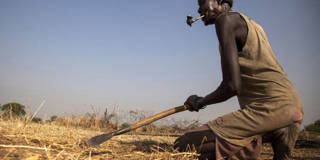The story of our food is much more than a combination of nutritional values, costs, and tastes; it is also a tale of globalization, poverty, and exploitation. If we consider how little has been done to protect the world’s agricultural workforce, what we eat should make us feel sick.
GENEVA – Food is a powerful storyteller. Our diet signals whether we cook at home, shop locally, prefer inexpensive dishes, or even think about what we eat. But the consumer side of mealtime is just one of food’s many plot lines. Food has backstories, too, none more unsavory than this one: agricultural workers – the people who make dinner possible – are also the most likely to go to bed hungry.
Every day, some 1.1 billion people – one-third of the global workforce – go to work at the world’s farms. And, every night, many of them return home – having suffered countless violations of their human rights – without enough money to feed themselves or their families.
Farm work is one of the only professions in which national legal protections are regularly ignored. Minimum wage standards endorsed by the International Labor Organization (ILO), and adopted by many industries around the world, remain either unenforced in the agriculture sector or do not extend to informal farm workers. But, because migrant labor makes up the bulk of the agricultural workforce, this gap in coverage has become a canyon.

GENEVA – Food is a powerful storyteller. Our diet signals whether we cook at home, shop locally, prefer inexpensive dishes, or even think about what we eat. But the consumer side of mealtime is just one of food’s many plot lines. Food has backstories, too, none more unsavory than this one: agricultural workers – the people who make dinner possible – are also the most likely to go to bed hungry.
Every day, some 1.1 billion people – one-third of the global workforce – go to work at the world’s farms. And, every night, many of them return home – having suffered countless violations of their human rights – without enough money to feed themselves or their families.
Farm work is one of the only professions in which national legal protections are regularly ignored. Minimum wage standards endorsed by the International Labor Organization (ILO), and adopted by many industries around the world, remain either unenforced in the agriculture sector or do not extend to informal farm workers. But, because migrant labor makes up the bulk of the agricultural workforce, this gap in coverage has become a canyon.